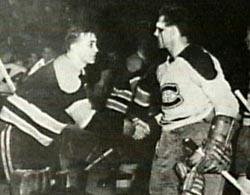Hear, hear
A study suggests that there may be fewer injuries to minor hockey players if bodychecking is introduced earlier.
"If bodychecking produces an initial period of adjustment as the current study suggests, then perhaps it would be better that the adjustment happens while the youngsters are smaller and have less speed."
Opponents to early bodychecking usually have one of two arguments: it diminishes skill development, or it is an injury concern.
I have always felt that injuries will be less likely when bodycheking is introduced earlier. Younger kids are surprisingly durable in collisions with other young kids. Relative to their weight, their bones are stronger than those of adults. Bone (and body) mass increases with the cube of bone diameter, while bone strength increases with the square of bone diameter. A five foot drop is nothing to a mouse, but will break an elephant's legs. A young child is more likely to absorb a ten foot fall without fracture than an adult. Lighter weight and less speed is a good combination when first learning how to throw/absorb a hit.
When introducing bodychecking at older ages, you also have to contend with teenage hormones. There will be kids out there just to throw hits and get away with violence. By making checking part of the sport with younger, more innocent kids, they learn to assimilate it with the rest of the things they love about playing hockey. There will be no sudden orgy of violence at age thirteen, because they already understand that collisions are just another part of the game.
The skill argument is a valid one. It is up to the coaching to develop skills in a practise environment without bodychecking, and of course it is crucial to have sane hockey parents. So many ugly things in hockey could be resolved with good coaching and reasonable parents...
"If bodychecking produces an initial period of adjustment as the current study suggests, then perhaps it would be better that the adjustment happens while the youngsters are smaller and have less speed."
Opponents to early bodychecking usually have one of two arguments: it diminishes skill development, or it is an injury concern.
I have always felt that injuries will be less likely when bodycheking is introduced earlier. Younger kids are surprisingly durable in collisions with other young kids. Relative to their weight, their bones are stronger than those of adults. Bone (and body) mass increases with the cube of bone diameter, while bone strength increases with the square of bone diameter. A five foot drop is nothing to a mouse, but will break an elephant's legs. A young child is more likely to absorb a ten foot fall without fracture than an adult. Lighter weight and less speed is a good combination when first learning how to throw/absorb a hit.
When introducing bodychecking at older ages, you also have to contend with teenage hormones. There will be kids out there just to throw hits and get away with violence. By making checking part of the sport with younger, more innocent kids, they learn to assimilate it with the rest of the things they love about playing hockey. There will be no sudden orgy of violence at age thirteen, because they already understand that collisions are just another part of the game.
The skill argument is a valid one. It is up to the coaching to develop skills in a practise environment without bodychecking, and of course it is crucial to have sane hockey parents. So many ugly things in hockey could be resolved with good coaching and reasonable parents...


0 Comments:
Post a Comment
<< Home